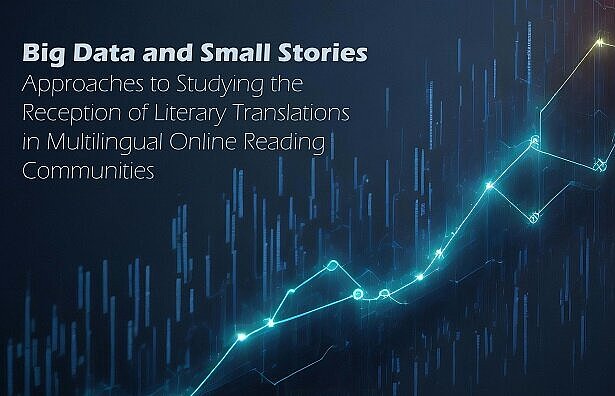“We know remarkably little about how readers construe translations.” This statement by Pym (2020, 453) highlights a blind spot of translation studies – the reception of translated texts by ‘real’ readers, rather than hypothetical idealised readers or professional readers like reviewers. While reader-reception studies focusing on written and particularly literary translation remain scarce, there is a growing body of research using experimental (Kruger 2013; Walker 2020), survey (Liang 2007), ethnographic (Tekgül 2019), corpus-assisted (Chen 2023; Liu & Baer 2017; Van Egdom & Kotze 2023) and computational approaches (Kotze et al. 2021).
In this presentation I consider particularly corpus-assisted and computational methods, which have mostly made use of the affordances of large quantities of user-generated book reviews from digital reading and reviewing communities like Goodreads. Such platforms offer unparalleled opportunities for investigating the reception of translation in a naturalistic setting, and on both large and small scale. I contrast two ways of analysing such data – computational or distant-reading analyses and close-reading narrative analysis – using the DIOPTRA-L (Digital Opinions on Translated Literature) database. DIOPTRA-L contains Goodreads reviews of approximately 100 contemporary literary texts that have been translated from and into Afrikaans, Dutch, English, French, German, Italian, Portuguese and Spanish. The corpus currently contains around 280 000 reviews and 33 million running words (see Kotze et al. 2021). I use this data to illustrate how computational and close-reading methods can be used in complementary ways to explore how factors like genre and translation language pair influence the cognitive and emotional ‘templates’ that readers use to evaluate and respond to translated literary texts, and how readers’ personal backgrounds intersect with these general patterns.
Guest Lecture as Part of the Interdisciplinary Lecture Series “Translation 2.0”
Moderation: Dr. Hannah Pardey (HHU)
When: 15 July 2025, 18:00
Where: HHU Building 23.21, Floor 02, Room 22
References
Chen, Xuemei. 2023. The role of childhood nostalgia in the reception of translated children’s literature. Target 35(4): 595-620.
Kotze, Haidee, Berit Janssen, Corina Koolen, Luka van der Plas & Gys-Walt van Egdom. 2021. Norms, affect and evaluation in the reception of literary translations in multilingual online reading communities: Deriving cognitive-evaluative templates from big data. Translation, Cognition and Behavior 4(2): 147-186.
Kruger, Haidee. 2013. Child and adult readers’ processing of foreignised elements in translated South African picturebooks: An eye-tracking study. Target, 25(2): 180-227.
Liang, Wen-chun. 2007. A descriptive study of translating children's fantasy fiction. Perspectives, 15(2): 92-105.
Liu, Bin, and Brian James Baer. 2017. Packaging a Chinese ‘beauty writer’: Re-reading Shanghai Baby in a web context. Meta 62(2): 415-434.
Pym, Anthony. 2020. Translation, risk management and cognition. In Fabio Alves and Arnt Lykke Jakobsen, eds. The Routledge Handbook of Translation and Cognition, 445-458. London: Routledge.
Tekgül, Duygu. 2019. Book club meetings as micro public spheres: Translated literature and cosmopolitanism. Language and Intercultural Communication, 19(5): 380-392.
Van Egdom, Gys-Walt & Haidee Kotze. 2023. What the invisible reader has to say about the invisibility of translation: Studying translation reception in online reading communities. In Peter J. Freeth & Rafael Treviño, eds. Beyond the Translator’s Invisibility: Critical Reflections and New Perspectives, 203-234. Leuven: Leuven University Press.
Walker, Callum. 2020. An Eye-Tracking Study of Equivalent Effect in Translation: The Reader Experience of Literary Style. London: Palgrave Macmillan.
Bionote
Haidee Kotze is professor and chair of translation studies at Utrecht University, and editor-in-chief of the journal Target. Her research explores the complexities of cognitive, linguistic, social, institutional and ideological aspects of different forms of translation and language contact in multilingual settings.


